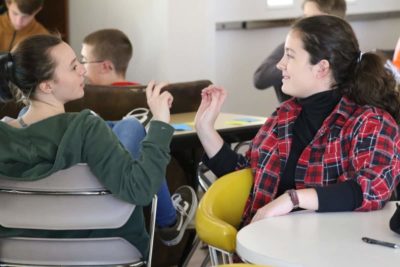
|
|

Lessons from the past school year. Plans for the year ahead. For EdNC’s Special Report, we asked leaders to share how the pandemic impacted education & what that means for the future. Read the rest of the series here.
Why are 8-year-old children in third grade? Is it because they are doing third-grade work, or is it because they are 8 years old?
Not all students are doing grade-level work, at least not in every subject. Much has been written and said about students not reading on grade level. According to the Kids Count Data Center, an estimated 64% of all North Carolina fourth grade students are below proficient in reading. Some students are, of course, reading well above grade level, but too many are reading well below that. The same can be said for other scholastic work such as writing, math, and science. All of this has been exacerbated due to the pandemic, especially for the students who are already behind.
It is time to have education meet the students rather than having students meet education. Education should be about competency and not attendance; it must be personalized and scaffolded. By focusing on outcomes and not process, we meet students where they are and give them the tools and support to develop the competencies to move on.
Competency-based education (CBE) focuses on students’ mastery of knowledge and skills rather than an academic calendar or seat-time requirement, not unlike how we already teach skilled trades and applied sciences.
Each school year, teachers across the country set goals and develop lesson plans and pacing guides to meet standards that are thrust upon them and aimed at the class average, forcing everyone to learn to the middle. What happens to those students who are not in the “middle”?
The result is a one-size-fits-all approach to education that burdens individual teachers with the responsibility to move the class “average” a full grade level, requiring many students to move more than one full grade level. Education should capitalize on students’ current knowledge and build upon that.
It has been said that “every system is perfectly designed to achieve the results it gets.” Let us therefore design an education system that focuses on the student and not on the grade level. Teachers have the ability and technology to provide every student a unique and personalized learning plan that develops competency and mastery instead of compliance and attendance. Every student should have a learning plan that fits their unique needs. We do this now for students with special needs to guide teachers on their progress.
Eliminating the concept of grade level is a complex challenge and a major paradigm shift in delivering education, but one that can and has produced terrific outcomes.
Meeting students where they are and capitalizing on their individual strengths is a simple concept but a difficult process. We must give teachers and administrators flexibility to use their judgement and build on their experience. Assessments must change so that teachers can determine students’ competency, not just their memory, and allow teachers to teach where and to whom they can most effectively provide impact.
Session Law 2019-212 directed the Department of Public Instruction to recommend transition steps to accomplish competency-based objectives. The report, issued in May 2020, concluded that “the individualized learning path allows all students to receive the appropriate level of instruction and differentiated support.”
RAND education experts, in their Report on Personalized Learning, said that “early evidence suggest that personalized learning can improve achievement for students regardless of their starting level of achievement.”
Moving to a competency-based education model will require deconstructing old mechanisms, changing the assessment process, and partnering with higher education and the workforce.
In this article from May 2020, Allison Redden of RTI asks “Where does North Carolina go from here?” and lists schools in North Carolina that are already moving forward with CBE. Redden and Kayla Siler of RTI have done extensive work on CBE. Additionally, Dr. Pamela Swanson, Superintendent of Westminster Public Schools in Colorado, has successfully moved her entire district to implement competency-based education. Swanson now holds an annual conference to help other schools and districts to move to CBE that is consistently sold out.
Many things are simple, but nothing is easy. The support of parents, administrators, and policymakers at every level is critical. Students have already lost at least a year’s worth of education growth because of the pandemic. The impact has been the more devastating for our poorest and most rural kids.
A competency-based education system works because it recognizes that every student learns differently. A competency-based education approach can meet students where they are and take them to where they want and need to be.
Editor’s note: Craig Horn serves on EducationNC’s Board of Directors.
Recommended reading




